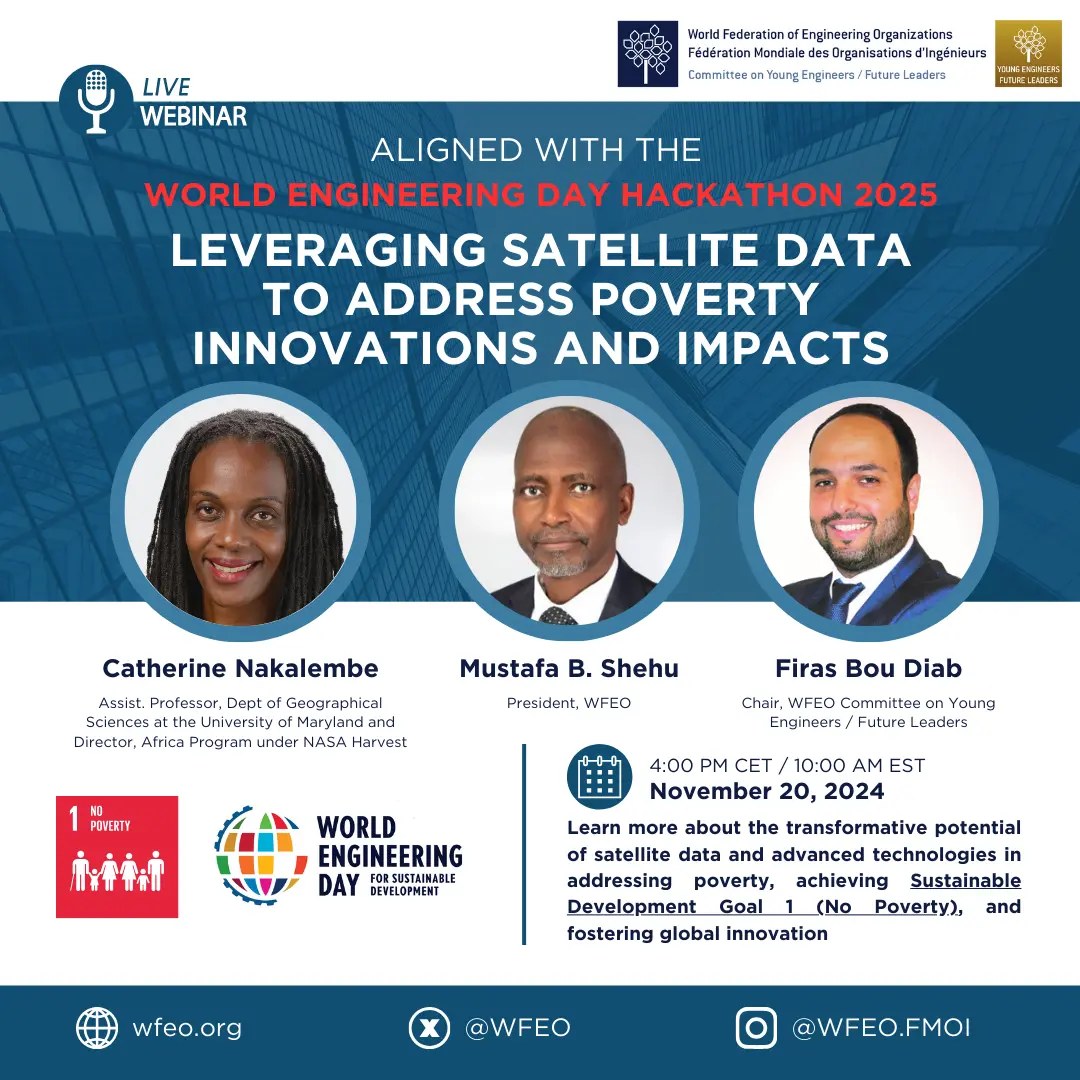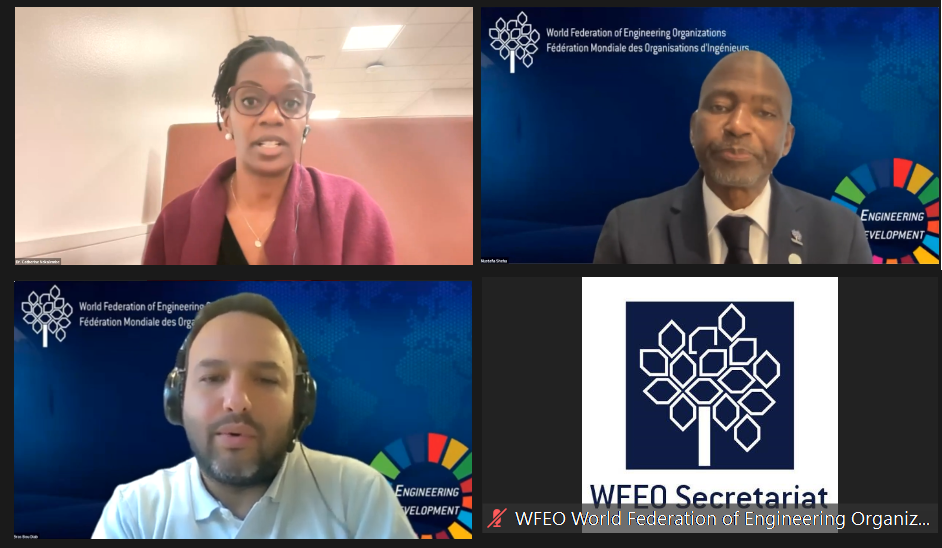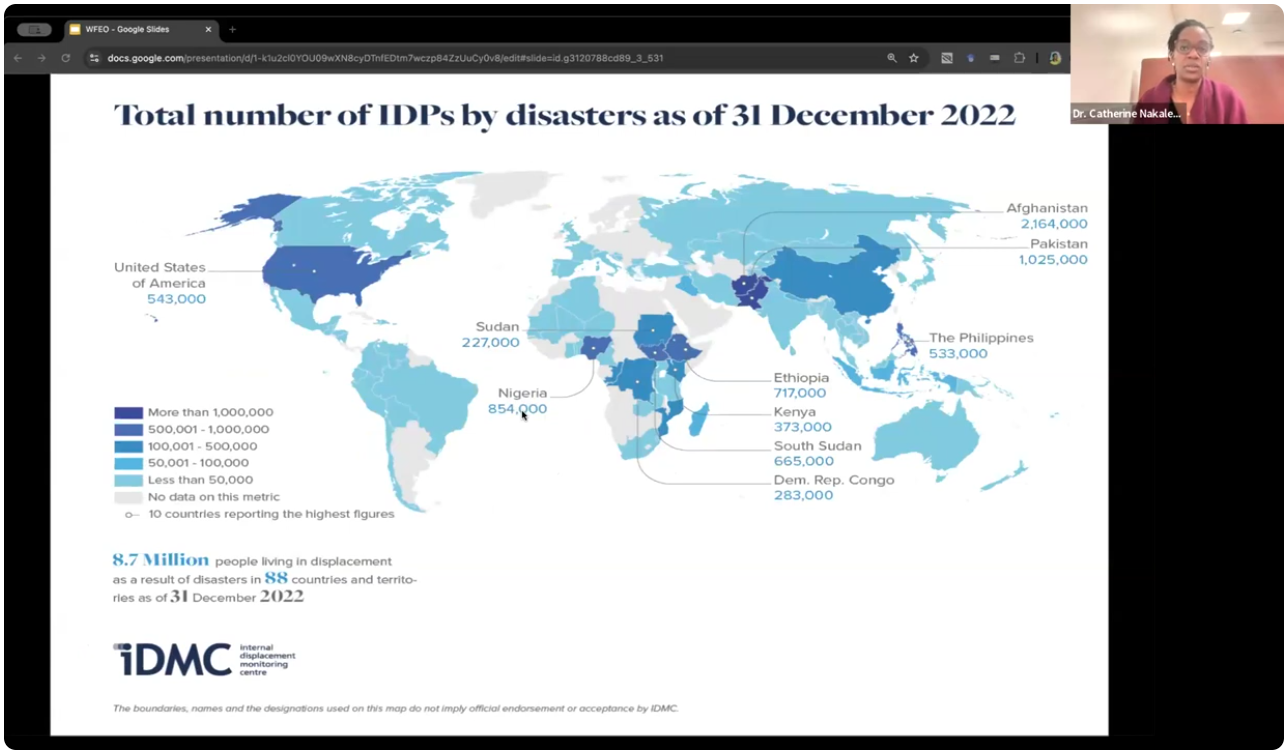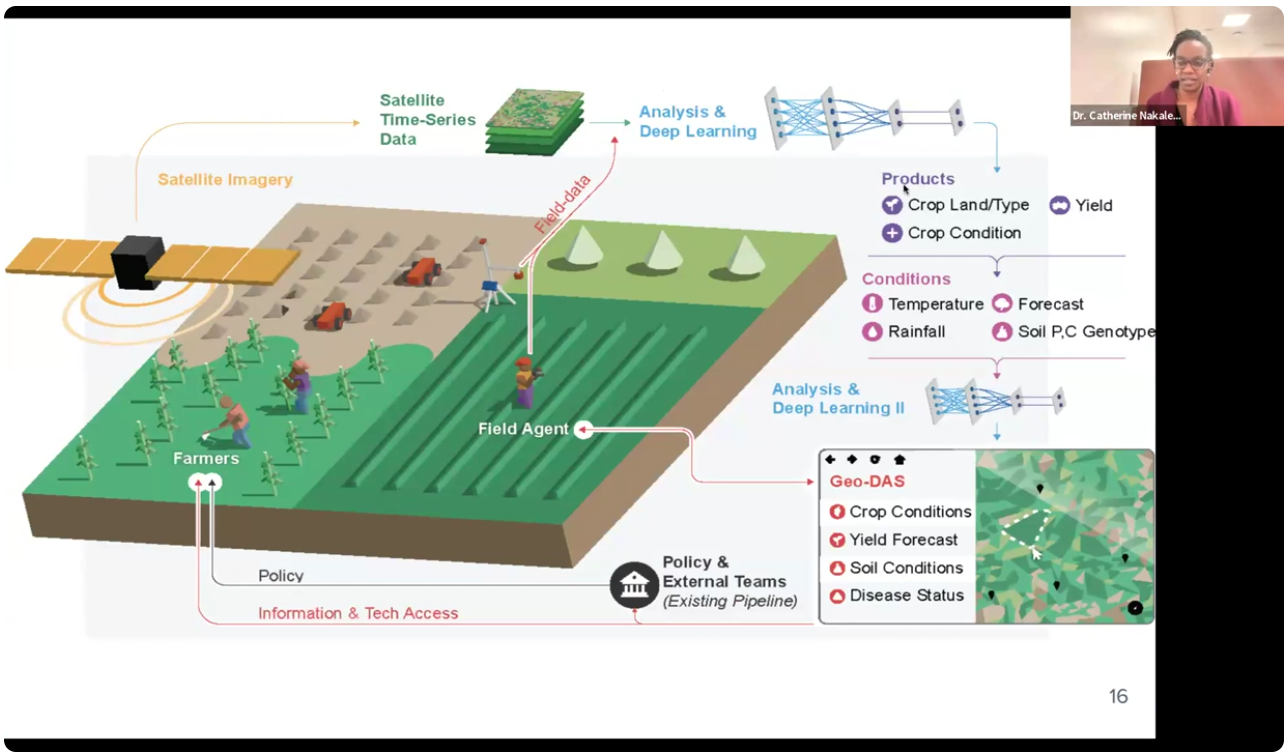
The WFEO Committee on Young Engineers/Future Leaders (WFEO-YEFL) hosted the webinar “Leveraging Satellite Data to Address Poverty: Innovations and Impacts” on 20 November 2024.
The recording is available by clicking on the below image.

This event was aligned with the World Engineering Day Hackathon 2025 and was focused on the transformative potential of satellite data and advanced technologies in addressing poverty, achieving Sustainable Development Goal 1 (No Poverty), and fostering global innovation.
Keynote Speaker
The webinar featured Dr. Catherine Nakalembe, Assistant Professor in the Department of Geographical Sciences at the University of Maryland and Director of the Africa Program under NASA Harvest. Dr. Nakalembe is a renowned expert in applying Earth observation data and machine learning to address agriculture and food security challenges, particularly in vulnerable regions.
Her groundbreaking research and capacity-building efforts have directly influenced disaster risk financing, agricultural monitoring systems, and food security frameworks in various countries, including Uganda, Kenya, and Mali. Her impactful work has been recognized globally, earning her prestigious awards like the 2022 Golden Jubilee Medal (Uganda) and the 2020 Africa Food Prize.
Webinar Objectives
This session aimed to:
- Explore how satellite data and Earth observation tools can contribute to poverty reduction efforts.
- Showcase innovative applications of satellite technology in agriculture, food security, and disaster management.
- Inspire meaningful discussions on leveraging technology to achieve sustainable development goals, particularly SDG 1.
Dr. Nakalembe’s Expertise
Dr. Nakalembe brought a wealth of experience, including:
- Developing machine learning tools for agricultural and disaster monitoring using satellite data.
- Leading capacity-building initiatives for government ministries and regional agencies in Africa.
- Conducting research that has directly impacted policies and programs, including the Disaster Risk Financing Project in Karamoja, Uganda, which supported over 300,000 drought-affected individuals.
- Collaborating with global organizations such as NASA, USAID, the Bill & Melinda Gates Foundation, and AGRA.
Speakers:
- Dr. Catherine Nakalembe, Assistant Professor in the Department of Geographical Sciences at the University of Maryland and Director of the Africa Program under NASA Harvest
- Mustafa B. Shehu, WFEO President
- Firas Bou Diab, Chair of WFEO-YEFL
Conclusion
This webinar was a thought-provoking session showcasing how technology, particularly satellite data, can revolutionize global efforts to alleviate poverty. Participants gained valuable insights into the intersection of innovation, sustainability, and development from leading experts and thought leaders.


For more information:
Dr. Catherine Nakalembe presentation
WFEO Committee on Young Engineers / Future Leaders website
Dr. Catherine Nakalembe Biography
Dr. Catherine Nakalembe is an assistant professor in the Department of Geographical Sciences at the University of Maryland. As the Director of the Africa Program under NASA Harvest and a NASA SERVIR Applied Science Team member, she leads projects developing and applying machine learning to Earth Observations to support agriculture and food security monitoring, early warning, and disaster assessment. Her work also leads training in using Earth observation tools to assess and forecast crop conditions and develop agricultural monitoring systems. Her capacity-building portfolio includes the government ministries in Kenya, Rwanda, Tanzania, Uganda, and Mali, as well as regional agencies such as the Regional Centre For Mapping Resource For Development (RCMRD) and IGAD Climate Prediction and Applications Center. Her work is funded by NASA, USDA, AGRA, Lacuna Fund (Meridian Institute), SwissRe Foundation, Bill and Melinda Gates Foundation, and USAID.
Dr. Nakalembe holds a Ph.D. in Geographical Science from the University of Maryland. Her research thesis titled Agricultural Land Use, Drought Impacts And Vulnerability: A Regional Case Study For Karamoja, Uganda, took a mixed-methods approach, combining remotely sensed satellite data, national agricultural surveys, census, and field data to expand on empirical knowledge on agricultural drought, land use and human perceptions of drought necessary for comprehensive drought forecasting, monitoring, and management. Her thesis directly informed the development of the Disaster Risk Financing Project in her study region, Karamoja, eventually supporting over 300,000 individuals impacted by drought. Uganda received the 2019 GEO SDG Award-Uganda for applying her research findings in their Disaster Risk Financing program from the Group on Earth Observations (GEO).
She also holds a Masters in Geography and Environmental Engineering from Johns Hopkins University, Baltimore, Maryland, and a B.Sc. in Environmental Science from Makerere University Kampala, Uganda.
Her honors include the 2022 Golden Jubilee Medal (the highest civilian award of Uganda), 2021 Fellowship from the UK Humanitarian Innovation Hub, and the 2020 Africa Food Prize from Alliance for a Green Revolution in Africa (AGRA), recognizing her dedication to improving food security in some of the most vulnerable regions in the world through the enhanced use of Earth observation. She received a 2019 Individual Excellence Award from Group on Earth Observations (GEO), Geneva, Switzerland. She was named a 2021 Quartz Africa Innovator 2021, 2021 Women Leading the Climate Fight, ABC NEWS, 2021 Women of Weather, Tomorrow.io, 15 Women Leading the ML4EO Community in 2021, Radiant Earth Foundation, 2020 An Innovator in International Food Security, NASA, 2020 Maryland Research Excellence Honoree of University of Maryland, College Park. She was featured in the 2020 Women and GIS, Volume 2: Stars of Spatial Science, Esri Press.
More information on Dr. Catherine Nakalembe
Website in development: www.catherinenakalembe.com
https://nasaharvest.org/
https://www.linkedin.com/company/nasaharvest/mycompany/
https://www.linkedin.com/in/catherinenakalembe/
https://twitter.com/CLNakalembe
https://geog.umd.edu/facultyprofile/nakalembe/catherine
NOV
2024
